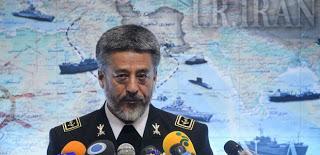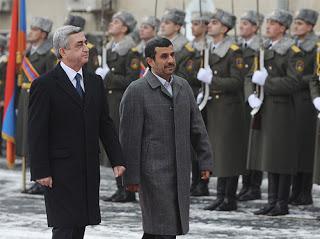 In May 2007, secretary general of the Collective Security Treaty Organization (CSTO) Nikolai Bordyuzha invited Iran to join the alliance, stating that “the CSTO is an open organization. If Iran applies in accordance with our charter, we will consider the application.” Although the CSTO was already dealing with Tehran on several collective security tasks – including the fight against illicit drug trade in Central Asia – Iranian accession to the organization still did not take place, basically due to the ayatollahs’ opposition to join a military bloc clearly dominated by a traditionally rival power of Iran such as Russia.
In May 2007, secretary general of the Collective Security Treaty Organization (CSTO) Nikolai Bordyuzha invited Iran to join the alliance, stating that “the CSTO is an open organization. If Iran applies in accordance with our charter, we will consider the application.” Although the CSTO was already dealing with Tehran on several collective security tasks – including the fight against illicit drug trade in Central Asia – Iranian accession to the organization still did not take place, basically due to the ayatollahs’ opposition to join a military bloc clearly dominated by a traditionally rival power of Iran such as Russia.
Established on May 15, 1992, the CSTO is an intergovernmental military alliance aimed at ensuring security in the former Soviet space following the collapse of the USSR. As a Moscow-led military organization, the CSTO is often viewed as the natural successor of the Warsaw Pact, having also been described as the “NATO of the East.” Currently consisting of Armenia, Belarus, Kazakhstan, Kyrgyzstan, Russia, Tajikistan and Uzbekistan, the CSTO is nevertheless dealing with the likely withdrawal of this latter, following Tashkent’s decision to suspend its participation to the organization in June 2012.
Tensions with Uzbekistan – whose foreign policy is steadily shifting towards a pro-US stance aimed at enhancing Tashkent’s geopolitical position in Central Asia after planned NATO withdrawal from Afghanistan in 2014 – makes urgent for the CSTO to counterbalance regional effects of the Uzbek defection. In this context, a southward expansion would be the best means to face the threat posed by possible spread of Islamic terrorism in Central Asia, while containing NATO expansion in the region. Nevertheless, being Turkmenistan a formally neutral state, the only country which the CSTO could turn to for cooperation is Iran.
For its side, the ayatollahs’ regime is also starting to deal with security issues on a regional scale, ending a long-standing policy of military isolation from the rest of the world, Syria excepted. This summer, Iranian Defense Minister Brigadier General Ahmad Vahidi said it is time to create a “military alliance of Muslim countries to reflect external aggression to them, and to protect the Palestinian people,” an organization which observers immediately envisioned as an “Islamic CSTO.” Although such a project might see the light in an indeterminate future, it is not a solution to the issue of Iran’s national security should Syria’s Bashar al-Assad regime be overthrown and the way to a Western attack on Tehran been paved.
On the other hand, the eventual defeat of loyalist forces in Syria, apart from the loss of the Tartus port – Russia’s only naval base in the Mediterranean – would have severe geopolitical consequences also for Moscow, since it would likely produce destabilizing effects in Russia’s Northern Caucasus. For this reason, in this particular historical period Iran and Russia are obliged to cooperate, putting their differences aside. As a result, after a possible fall of Assad, Iran might surprisingly join the CSTO, putting its national security under protection of Russia’s nuclear umbrella. The organization – not differently from NATO – contains in fact a provision according to which an attack on one of its members constitutes an attack on all.
ARMENIAN PRESIDENT SERZH SARGSYAN AND HIS IRANIAN COUNTERPART MAHMOUD AHMADINEJAD
 If the gains of Iran and Russia from Tehran’s accession to the CSTO would be nevertheless counterbalanced by reduced freedomof maneuver in the foreign policy of both countries, and the risk of a new Cold War against NATO, such a development would instead be a blessing for Armenia. Threaten by Turkey and Azerbaijan, the “Country of talking stones” is in fact a close ally of both Tehran and Moscow, to which owes its independence. As a result, following accession to the CSTO, Iran may strengthen its position not only in Central Asia, through Persian-speaking Tajikistan, but also in the Caucasus, through allied Armenia. Then, perhaps, even the eventual loss of Syria would be more than compensated by the appearance of a new Timurid Empire around the southern side of the Caspian Sea Basin.
If the gains of Iran and Russia from Tehran’s accession to the CSTO would be nevertheless counterbalanced by reduced freedomof maneuver in the foreign policy of both countries, and the risk of a new Cold War against NATO, such a development would instead be a blessing for Armenia. Threaten by Turkey and Azerbaijan, the “Country of talking stones” is in fact a close ally of both Tehran and Moscow, to which owes its independence. As a result, following accession to the CSTO, Iran may strengthen its position not only in Central Asia, through Persian-speaking Tajikistan, but also in the Caucasus, through allied Armenia. Then, perhaps, even the eventual loss of Syria would be more than compensated by the appearance of a new Timurid Empire around the southern side of the Caspian Sea Basin.

